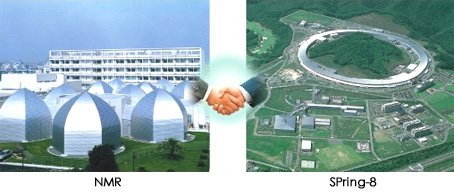
In recent years, the media has carried many articles on international collaboration and competition in the post-genomic field of structural genomics.
The aim of research in structural genomics is to rapidly and efficiently identify a number of protein structures based on a systematic method, making use of the massive genomics database available today.
The RIKEN Structural Genomics/Proteomics Initiative (RSGI) was launched in April 2001 to carry out this work.
The aim of the RSGI is to carry out large-scale, rapid structure analysis via collaboration between the Yokohama Institute, which mainly uses nuclear magnetic resonance (NMR) analysis, and the Harima Institute, which primarily conducts synchrotron radiation crystallography using SPring-8.
In addition to promoting structural analysis, the RSGI will contribute to the international field of structural genomics through a number of projects:
(1) construction of two new structural genome beamlines at SPring-8;
(2) development of protein production systems, e.g. cell-free systems for simplified and large-scale protein expression screening and production, using full-length cDNA clones that can be directly used for protein expression and large-scale technologies for screening of crystallization conditions;
(3) automation of crystallography data collection; and
(4) development and improvement of crystal structure analysis techniques.
RIKEN will function as the core of the Protein 3000 Project, a national project on genomic drug development.
The RSGI is promoting protein structure analysis through collaboration between the Yokohama Institute and the Harima Institute.







